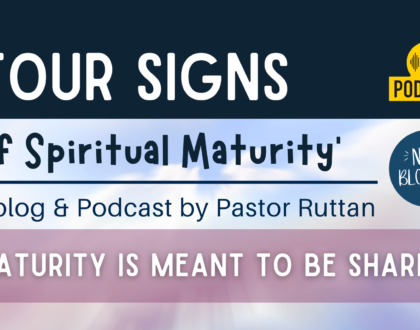The day you discover the pastor isn’t perfect
by Westminster
I know it’s a suspicious title for a blog. I don’t mean to be alarmist. And don’t worry. I haven’t been charged with anything or put in jail!
The reason I write this is because pastors are imperfect and under a microscope most of the time. We pastors call it the ‘fish bowl.’ I’m not begrudging it. It just goes with the territory. But there can also be a lack of clarity about the role.
To give you some insight about my intent with this post, maybe it would be good to know that another title for it could have been: ‘What you should truly expect from your pastor.’
But let’s back up a moment.
I’m guessing that most—or all—of you have discovered at some point or another that your pastor isn’t perfect. If it hasn’t happened to you yet, it will.
I’ve been the pastor of Westminster Church in Barrie for ten years, and I know that there are times when I’ve handled a certain situation wrong, or said something insensitive, or missed an opportunity, or chosen the easy path instead of the right one. There are times when I’ve haven’t been as diligent as I should have been in preaching or in my care for someone who was sick. Those things weigh heavy on me.
People notice. And they can get disappointed.
Romans 3:23 says, “all have sinned and fall short of the glory of God.” Bingo! That certainly applies to me, and also to other pastors and church leaders.
But to be honest, a lot of people aren’t sure what to think next after they’ve come to that realization. So let me offer three thoughts:

First, a high standard.
Even though pastors aren’t perfect, they are in fact held to a certain standard. And it’s a high one.
James 3:1 says that “we who teach will be judged more strictly.” We are to be an example to the flock (1 Peter 5:3), and are to strive to reach “the whole measure of the fullness of Christ” as we build up the church and equip God’s people for “works of service” (see Ephesians 4:11-13).
I also think of the many times Jesus chastised the religious leaders of his day for hypocrisy. There is definitely a standard, and it’s a high one.
Second, a person of their word.
When thinking about what you should (actually) expect from your pastor, I think it’s helpful to consider what they promised when they were ordained.
For example, when I was ordained I was asked four questions. One of them was this:
“Do you promise in the strength and grace of the Lord Jesus Christ to conduct yourself in your private and public life as becomes his gospel, and do you give yourself diligently and cheerfully to the service of Christ’s word, sacraments and discipline, for the furtherance of his reconciling mission in the world?”
When I examine myself I can see that I haven’t always done this well. There are days when I feel like I missed the mark. It’s a work in progress. But a congregation should expect that I’m doing my best to keep this promise.
Third, humility.
When I first started writing this post I included a bunch of character traits that are found in the Bible—things like love, prayerfulness, diligence and orthodoxy. All of that is massively relevant.
But here I want to focus on something I think is misunderstood, and therefore, neglected:
Humility.
A seminal passage about following Jesus is taking up a cross daily and following him (Luke 9:23). It’s about humbling yourself before God, and striving to make your life more Christ-centred and less self-centred. Not surprisingly then, humility comes up time and time again as a trait not only for Christians in general, but for leaders within the church. In fact, it says that God actually “opposes the proud but shows favor to the humble” (1 Peter 5:5; Proverbs 3:34, emphasis added).
C.S. Lewis also offers this insight: “Humility isn’t thinking less of yourself, but of yourself less.” Ponder that for a second. It reminds us that humility isn’t about being self-deprecating or unconfident. It’s about a war with pride and ego as the pastor carefully attends to the interests of others in how they teach and lead.
I think it’s a real concern. Being the main person ‘out front’ who offers authoritative and influential teaching, and who others come to for advice and prayer, can distort a pastor’s perception of reality and inflate their sense of self-importance.
I often wonder to myself, ‘Should I really be doing this?’ ‘Am I up to the task?’ I think those are healthy questions.
So as far as I see it, the main way to grow humility is to be open to the Holy Spirit’s work in your life through prayer, Bible reading, worship, and the wise counsel of others. The most effective leaders lead from their knees. And being Scripture-steeped is a pastor’s first defense against harmful personal agendas.
As I’ve looked around at the pastors I respect most, here is what I’ve found: The more maturity, the more humility; the more humility, the more maturity.
I would also say—again, based on my own experience—that when you find a pastor who is arrogant and un-humble, you will find an immature leader who is probably being ineffective in leadership and possibly causing damage.
Having said all that, I know that I personally have a lot of work to do! I don’t claim to get an A+ in the humility department, not even close. But others should see that I am trying to be more Christ-centred and less self-centred, and that I don’t seek superiority, but humble authenticity under God.
Let me sum up a few things.

Some people have unrealistic expectations. Maybe that will always be the case in our fish-bowl context. It’s just easier to look at someone else than yourself. And do you know what? I’m not too worried about that. The bigger concern is realisticexpectations.
Pastors aren’t called to be “perfect.” Pastors are called to be pastors.
It’s not about making people happy.
It’s not about being all things to all people.
It’s not about out-churching other churches.
It’s not about always being right.
It’s not about bigger-is-always-better.
It’s not even about everybody always getting along.
The bottom line is that it is all about Jesus Christ.
And as far as the pastor’s calling is concerned, it’s about (a) doing their broken best to lean on God’s strength and take seriously the high standard expected of them, (b) being a person of their word as they strive to live out their ordination vows, and (c) cultivating humility.
And you have a role in this. The Bible say that pastors are worthy of honour (1 Timothy 5:17, 1 Thessalonians 5:13). You should pray for your pastor, know that you share in the ministry of the church with them, encourage them in the vital and life-changing work they do, and take an interest in their health and well-being.
A leader is someone who knows who to follow. If they get that person (or persons) wrong, everything falls apart. If they get it right, they can be a faithful teacher of the Teacher they serve.
#Jesus
- Sign-up for my free, 1-minute daily email devotional called “Up!” here
- Go here to learn more about my new book of daily devotionals called “Up!”
Recommended Posts

Four Signs of Spiritual Maturity
April 25, 2024

Holy Week and Easter at Westminster – 2024
March 09, 2024

Elder Update about Church Activities & Covid-19 (Feb 2, 2022)
February 02, 2022